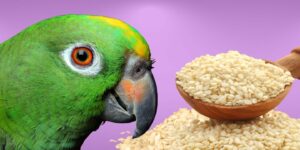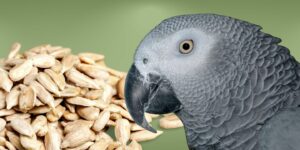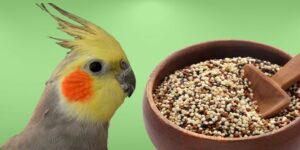Yes, birds can eat flax seeds. Flax seeds are a good source of omega-3 fatty acids, fiber, and antioxidants, making them a nutritious addition to a bird's diet. However, it is important to feed flax seeds to birds in moderation and as a supplement to their regular diet, rather than as the main source of nutrition.
What are Flax Seeds?
Flax seeds come from the flax plant and have been used as a dietary supplement for both humans and animals due to their high nutritional content. These tiny seeds are packed with important nutrients that can be beneficial to a bird's overall health.
Nutritional Content of Flax Seeds
Flax seeds are particularly rich in omega-3 fatty acids, fiber, and antioxidants. They also contain some vitamins and minerals such as B vitamins, magnesium, phosphorus, and manganese.
Benefits of Flax Seeds for Birds
Omega-3 Fatty Acids
Role in Skin and Feather Health
Omega-3 fatty acids are essential for maintaining healthy skin and feathers in birds. These fatty acids help to keep their skin moisturized and support the growth of strong, vibrant feathers.
Role in Immune System Support
Omega-3 fatty acids also play a crucial role in supporting a bird's immune system. They help to regulate inflammation and improve the overall function of the immune system, which can protect birds from various infections and diseases.
Fiber
Digestive Benefits
The fiber content of flax seeds can aid digestion and help with the overall functioning of a bird's gastrointestinal system. Fiber adds bulk to the diet, which aids in the movement of food through the digestive tract.
Constipation Prevention
Fiber in flax seeds also helps to prevent constipation in birds by promoting regular bowel movements and softening the stool.
Antioxidants
Protection against Free Radicals
Flax seeds contain antioxidants, which help to protect cells from damage caused by free radicals. Free radicals are unstable molecules that can damage cells and contribute to aging and diseases.
Disease Prevention
Antioxidants in flax seeds can help to prevent a variety of diseases, including heart disease, inflammation, and certain types of cancer.
Risks of Feeding Flax Seeds to Birds
Weight Gain
Fat Content of Flax Seeds
Flax seeds are high in fat, which can cause weight gain in birds if fed in large amounts. It is important to feed flax seeds in moderation to avoid the risk of obesity.
Importance of Moderation
As with any supplemental food, moderation is key when feeding flax seeds to birds. Overfeeding flax seeds can lead to an imbalanced diet, weight gain, and other health issues.
Proper Preparation
Grinding or Crushing Flax Seeds
Flax seeds should be fed to birds ground or crushed, as whole flax seeds may pass through the digestive system undigested. This ensures that birds can properly digest and utilize the nutrients available in flax seeds.
Whole Flax Seeds and Digestion
Feeding whole flax seeds to birds may result in the seeds passing through their digestive system without being broken down, which means they will not receive the full benefits of the nutrients they contain.
Reduced Female Productivity
Fat Deposition around Reproductive System
Feeding high amounts of flax seeds as the main diet can lead to reduced female productivity due to the high amount of fat in them. The high amount of fat in flax seeds leads to fat deposition around the reproductive system of a female bird, which may impact fertility.
Importance of Balanced Diet
A balanced diet is crucial for the overall health and well-being of birds, including their reproductive health. Supplementing with flax seeds can provide important benefits but should not replace a well-rounded diet.
How to Feed Flax Seeds to Birds
Supplementing Regular Diet
Flax seeds can be fed to birds as a supplement to their regular diet. They can be mixed with seeds, pellets, or other types of food.
Recommended Portion Sizes
It is recommended to feed no more than a teaspoon of flax seeds per day for small to medium-sized birds and no more than a tablespoon for large birds.
Varied Diet
Importance of Offering Different Foods
In addition to flax seeds, it is important to offer a variety of different foods to ensure that birds receive all the nutrients they need for optimal health.
Providing Clean, Fresh Water
Birds should always have access to clean, fresh water to keep them hydrated and support their overall health.
Conclusion
In conclusion, flax seeds can be a nutritious addition to a bird's diet in moderation. They offer many health benefits, including omega-3 fatty acids, fiber, and antioxidants. However, it is important to feed flax seeds to birds in moderation and as a supplement to their regular diet, rather than as the main source of nutrition. Proper portion size and preparation are also important considerations when feeding flax seeds to birds.







